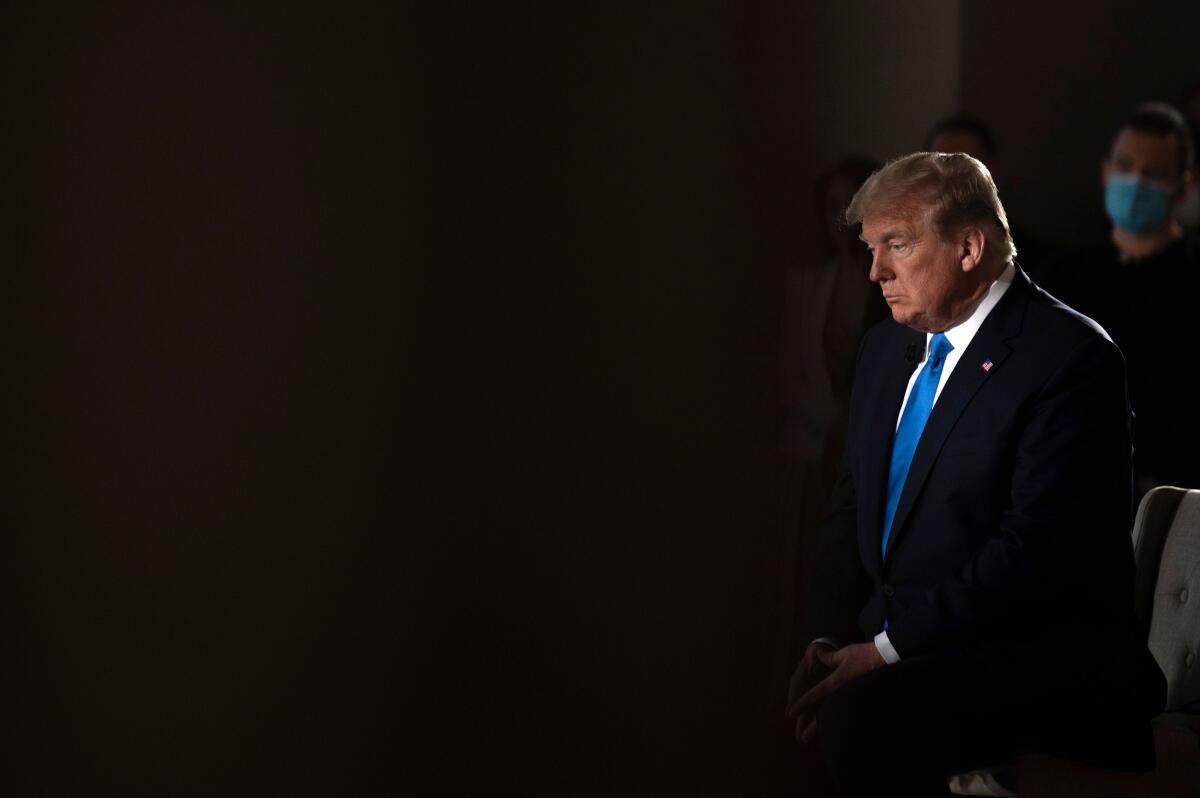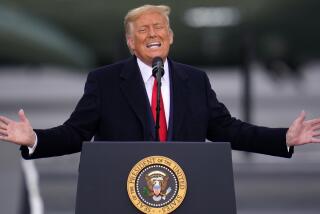Trump rarely shows empathy in coronavirus crisis

WASHINGTON — For weeks, waves of grief have washed across the country as hundreds, then thousands, then tens of thousands of Americans have died from COVID-19 in the deadliest disease outbreak in a century.
But when President Trump leaves the Washington area on Tuesday for the first time since March, he isn’t going to meet with devastated families, as presidents normally do during times of national crisis. He won’t console survivors or comfort victims.
He will visit a factory where workers are churning out protective masks in Phoenix. Arizona Gov. Doug Ducey has extended a statewide stay-at-home order until May 15, but some businesses and two sheriffs have vowed to defy the order — in keeping with Trump’s increasingly insistent call for states to reopen their economies.
The danger of opening too soon was clear Monday with reports that the Trump administration is privately projecting a steep increase in deaths this month. The daily death toll will reach about 3,000 on June 1, according to an internal document obtained by The New York Times, nearly double the current number of about 1,750.
The White House said the new projections, based on government modeling compiled by the Federal Emergency Management Agency, had not been vetted. But the estimates put Trump’s determined efforts to reopen the economy — and his few expressions of compassion for the victims — in sharp relief.
The pandemic, of course, offers limited opportunities for the president to embrace survivors or first responders because any gatherings can spread infections.
There are no public funerals at which Trump can speak, as President Obama did after a racist attack on a black church in Charleston, S.C. in June 2015. Nor can he safely charge into a New York City emergency room and rally the doctors like President George W. Bush did with first responders after the Sept. 11, 2001, attacks.
But even hunkered down in the White House, Trump has largely walled himself off from the nation’s suffering. He has hosted numerous White House events with business leaders, lawmakers and other visitors, but only one with a handful of survivors.
The empathy deficit was on full display in recent days, including a startling positive spin on the nearly 70,000 dead.
After claiming Friday that “our death totals, our numbers, per million people, are really very, very strong” and that he was “very proud,” Trump suggested Sunday that his administration deserves credit for preventing much worse.
“If we didn’t do it, the minimum we would have lost was a million-two, a million-four, a million-five, that’s the minimum,” Trump said.
Sign up for Essential California
The most important California stories and recommendations in your inbox every morning.
You may occasionally receive promotional content from the Los Angeles Times.
After Bush released an affecting video message Saturday that urged Americans to put partisanship aside to fight the pandemic, citing a “spirit of service and sacrifice,” Trump slammed the former Republican president for staying silent during his impeachment.
And when Trump held a Fox News “town hall” at the Lincoln Memorial on Sunday, Trump claimed he was treated worse by the media than the assassinated president.
“They always said, Lincoln, nobody got treated worse than Lincoln,” said Trump, seated beneath Lincoln’s giant marble statue. “I believe I am treated worse.”
During Trump’s frequent White House briefings on the pandemic, his prepared remarks often include sympathy for people who lost loved ones, but he rarely lingers on the issue.
When asked on April 30 if he was considering leading a moment of mourning for the dead, Trump did not directly respond, instead boasting how empathetic he is.
“I don’t think anybody can feel any worse than I do about all of the death and destruction that’s so needless. Nobody,” he said.
Then he shifted to talking about the need to ease lockdown orders so the economy can be revived.
Two days earlier, a reporter asked Trump if he had spoken to the families of people who died from the virus, and whether their stories had affected him.
“I’ve spoken to three, maybe, I guess, four families unrelated to me,” he said. “I lost a very good friend. I also lost three other friends, two of whom I didn’t know as well, but they were friends and people I did business with.”
Trump added, “it’s a bad death,” then segued into more comfortable topics. He mentioned that young people are less vulnerable to the virus and “do extraordinarily well. That’s why I think we can start thinking about [reopening] schools.”
Two weeks earlier, on April 14, Trump sat down at the White House with several recovered patients. He used the occasion to tout an unproven remedy for the coronavirus, the antimalaria drug hydroxychloroquine, urging participants to say how much it helped them recover.
Trump didn’t linger on the topic of death when Karen Whitsett, a state representative from Michigan, mentioned that she had “lost several family members” to COVID-19.
“No kidding,” Trump replied.
The Food and Drug Administration has since cautioned against using hydroxychloroquine to treat COVID-19 unless the patient is closely monitored in a hospital or clinical trial because it can cause heart rhythm problems.
While it’s hardly a new phenomenon, Trump’s obsession with his image during a time of national peril may partly explain the drop in his job approval ratings in recent weeks, in contrast to the “rally around the flag” popularity boost that Bush saw after 9/11.
Trump’s public responses “reaffirm that he has no empathy, isn’t interested in developing a national consensus for healing, that he needs attention, that he is unwilling to share the spotlight with the real heroes...,” said Timothy Naftali, a presidential historian at New York University. “Donald Trump is a victim of his own shortcomings and we’re all paying a price.”
Trump lack of apparent empathy may hinder his reelection bid. His presumed Democratic opponent in November, Joe Biden, has spoken and written at length about his family tragedy, and the issue resonates with some voters.
Soon after Biden first won a U.S. Senate seat in 1972, his wife and baby daughter were killed in a car accident. One of his two sons was stricken with a brain tumor and died in 2015.
Trump also has experienced family tragedy — his older brother was an alcoholic who died at 42 years old in 1981 — but he has rarely spoken about it.
By all accounts, he is uncomfortable with any sign of illness. Preoccupied with projecting strength and robust health, he has gotten angry with aides who cough or sniffle around him and has, despite the guidelines from his own coronavirus taskforce, refused to wear a face mask amid the pandemic.
Trump’s staff sometimes has to remind him to show a human touch.
After a gunman killed 17 people and wounded 17 others at Marjory Stoneman Douglas High School in Parkland, Fla, on Feb. 14, 2018, Trump held a meeting with gun violence survivors at the White House, and photographers spotted him holding a list of talking points.
The fifth and final one was, “I hear you.”
More to Read
Sign up for Essential California
The most important California stories and recommendations in your inbox every morning.
You may occasionally receive promotional content from the Los Angeles Times.












